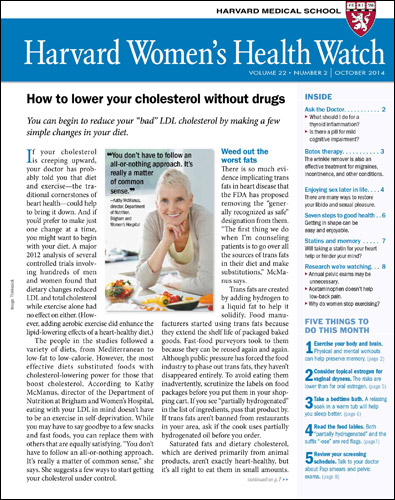Harvard Health Blog
Twelve tips for healthier eating in 2012
If healthier eating is on your list of resolutions for 2012, look no further. The January 2012 issue of the Harvard Women’s Health Watch offers 12 ways to break old dietary habits and build new ones.
For many years, nutrition research focused on the benefits and risks of single nutrients, such as cholesterol, saturated fat, and antioxidants. Today, many researchers are exploring the health effects of foods and eating patterns, acknowledging that there are many important interactions within and among nutrients in the foods we eat.
The result is a better understanding of what makes up a healthy eating plan. Here are five food- or meal-based ways to improve your diet that we list in the article (you can see all 12 on the Harvard Health website):
Pile on the vegetables and fruits. Their high fiber, mineral, and vitamin content make fruits and vegetables a critical component of any healthy diet. They’re also the source of beneficial plant chemicals not found in other foods or supplements.
Go for the good fats. Polyunsaturated fat, including vegetable oils and omega-3 fatty acids (found in fish, seeds, nuts, and canola oil), as well as monounsaturated fat (avocados, olive oil, and canola oil), are good for health, even more so when you eat them in place of saturated fats.
Replace refined grains and potatoes with whole grains. Refining grain reduces or eliminates the bran and germ of the natural grain, vitamins and minerals, antioxidants, and phytochemicals. It also makes the starch highly digestible. Eating highly digestible starch causes surges in insulin and blood sugar, boosts triglycerides, and lowers protective HDL cholesterol. The starch in potatoes is also rapidly digested. Be adventurous. In addition to whole wheat and brown rice, try quinoa, millet, farro, and amaranth.
Dine mindfully. Taking time to savor your food not only helps you enjoy it more, it also helps control your appetite. If you eat too quickly, the brain may not receive signals that the stomach is full. Put down your fork between bites and chew more slowly.
Eat breakfast. The daily morning rush sometimes means you skip breakfast. Don’t. A healthy morning meal makes for smaller rises in blood sugar and insulin throughout the day, which can lower the risk of overeating.
You can read the full article here.
About the Author

Carolyn Schatz, Former Editor, Harvard Women's Health Watch
Disclaimer:
As a service to our readers, Harvard Health Publishing provides access to our library of archived content. Please note the date of last review or update on all articles.
No content on this site, regardless of date, should ever be used as a substitute for direct medical advice from your doctor or other qualified clinician.













